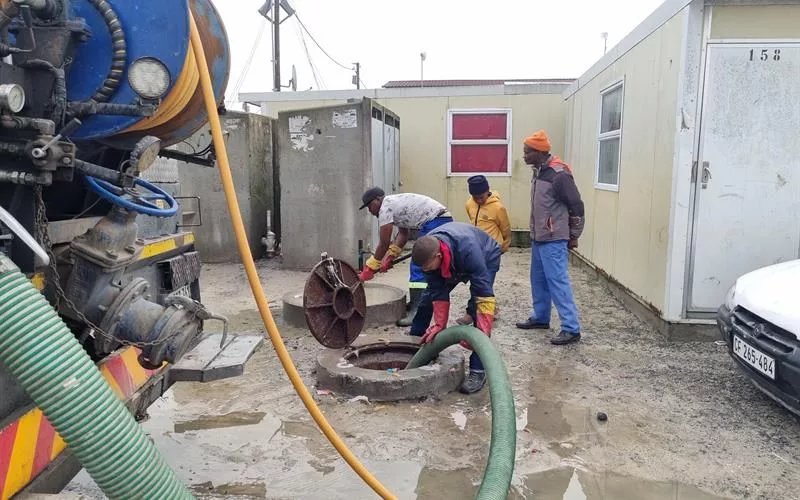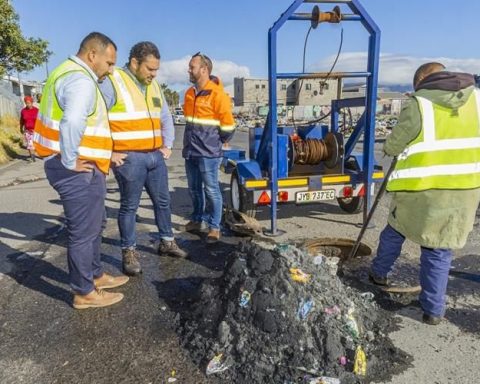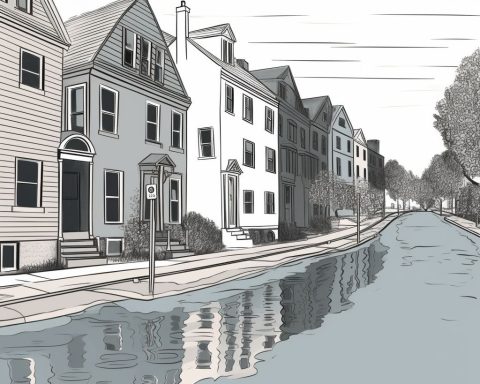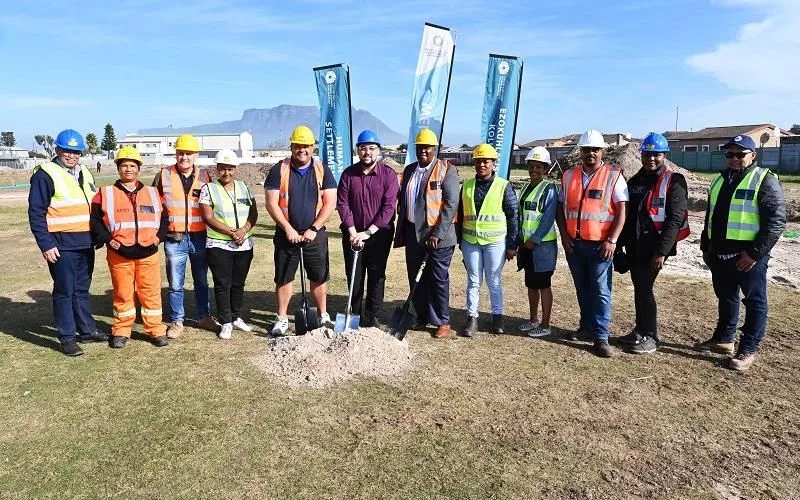The maintenance of vast sewage and river systems is a strategic priority, particularly as a sewage overflow or river flood is the last thing a city needs during the colder months. The city’s Water and Sanitation Directorate is preparing for winter’s increased stormwater volume by cleaning sewer pipelines, clearing litter traps in river systems, and monitoring stormwater-to-sewer connections. Residents can help by adhering to protocols like flushing only human waste and reporting blockages and overflows. By collaborating with the city’s efforts, we can ensure a safer and cleaner winter season.
Preparing for Winter: How the City is Preventing Sewage Overflows and River Floods
The city’s Water and Sanitation Directorate is working diligently to prepare for winter’s increased stormwater volume. Proactive measures include cleaning sewer pipelines, clearing litter traps in river systems, and monitoring stormwater-to-sewer connections. Residents can aid in preventing sewer overflows by adhering to protocols like flushing only human waste and reporting blockages and overflows. By collaborating with the city’s efforts, we can ensure a safer and cleaner winter season.
Winter’s icy touch signals the arrival of a season of potential hardships, but the city’s Water and Sanitation Directorate is neither dormant nor unprepared. On the contrary, they are diligently bolstering their infrastructure, readying the city’s sewage and river systems to handle the increased volume of stormwater that winter typically ushers in.
The city’s sewage system, a complex matrix of pipelines, drains, pumping stations, and water treatment plants, is spread across an impressive 10,000 kilometres. The river system, with its own set of assets – canals, rivers, tributaries, ponds, and stormwater dams, calls for constant attention. The maintenance of these vast networks is a strategic priority, particularly as we brace ourselves for the colder months, as a sewage overflow or river flood is the last thing a city needs.
Active Steps to Tackle Sewage Overflow
Throughout the year, the city’s Water and Sanitation teams have been laboring relentlessly on their maintenance plans to ensure that the city’s network of sewer pipes, pumping stations, and river systems are equipped to handle the rains of winter. This includes proactive measures like cleaning main sewer pipelines, rehabilitating collapsed sewers, and replacing malfunctioning or damaged manhole covers. Other endeavors include the surveillance of telemetry alarm systems and inspection of unauthorized stormwater-to-sewer connections. These ongoing efforts play a significant role in mitigating the risk of sewer overflows.
Preventing Flooding in River Systems
The assets of the river system are expansive and necessitate consistent surveillance. The proactive approach includes clearing litter traps, ponds, canals, culverts while keeping these areas under regular scrutiny. Initiatives have been initiated predominantly in areas such as Khayelitsha Wetlands, Vygeboom Dam in Durbanville, and Gordons Bay Natural Streams. Work is also currently ongoing in other areas like Geelslot in Somerset West and Bottelary River in Kuils River, to mention a few.
Citizen Contributions to Prevent Overflows
While the city’s initiatives are indeed praiseworthy, it’s crucial to remember that as residents, we also play a significant role in preventing sewer blockages and overflows. Around 80% of sewer overflows can be attributed to irresponsible human behavior, including disposing of items such as rags, feminine hygiene products, construction debris, and even cutlery, into the sewer system.
During winter, this behavior exacerbates the overflow situation. Sewer systems, already strained with foreign items, become overwhelmed during heavy rainfall due to the illegal discarding of debris, sand, and rubble that wash into the sewer system. Excessive rainwater enters via open manholes and from unauthorized stormwater-to-sewer connections, creating obstructions, lessening pipe capacity, and damaging infrastructure like pump stations.
High-risk areas such as Bishop Lavis, Philippi, Gugulethu, and Khayelitsha have been identified by the city based on the highest number of sewer-related service requests received during the last winter season. Proactive measures are taken in these areas to minimize the chance of overflows due to stormwater infiltration.
How Citizens Can Contribute
In the battle against sewer overflows and blockages, residents can make a significant impact by adhering to certain protocols: flush only human waste and toilet paper, utilize the city’s solid waste services, ensure there are no illegal stormwater-to-sewer cross-connections, and make sure rainwater gutters don’t empty into the sewer system.
Residents have multiple avenues to report sewer blockages, overflows, and vandalism, including WhatsApp, online platforms, email, SMS, calls, or by visiting a city walk-in center. Each report should contain a street address and a reference number should be secured.
By sticking to these practices, residents can aid the city in its efforts to stave off sewer overflows and flooding, ensuring a safer and cleaner winter season. The unseen work that goes into maintaining our city may not be apparent, but its impact on our daily lives is profound. It guarantees a thriving city and a healthy living environment, even in the brutal winter months. The city’s Water and Sanitation Directorate, the unsung heroes of our urban landscape, deserve our gratitude and collaboration in their endeavors.
What is the city doing to prevent sewage overflows and river floods during winter?
The city’s Water and Sanitation Directorate is preparing for winter’s increased stormwater volume by cleaning sewer pipelines, clearing litter traps in river systems, and monitoring stormwater-to-sewer connections.
What steps is the city taking to tackle sewage overflow?
The city’s Water and Sanitation teams have been laboring relentlessly on their maintenance plans to ensure that the city’s network of sewer pipes, pumping stations, and river systems are equipped to handle the rains of winter. This includes proactive measures like cleaning main sewer pipelines, rehabilitating collapsed sewers, and replacing malfunctioning or damaged manhole covers.
How is the city preventing flooding in river systems during winter?
The proactive approach includes clearing litter traps, ponds, canals, culverts while keeping these areas under regular scrutiny. Initiatives have been initiated predominantly in areas such as Khayelitsha Wetlands, Vygeboom Dam in Durbanville, and Gordons Bay Natural Streams.
What can citizens do to prevent sewage overflows and blockages during winter?
Residents can make a significant impact by adhering to certain protocols: flush only human waste and toilet paper, utilize the city’s solid waste services, ensure there are no illegal stormwater-to-sewer cross-connections, and make sure rainwater gutters don’t empty into the sewer system.
What are the high-risk areas for sewage overflows during winter?
High-risk areas such as Bishop Lavis, Philippi, Gugulethu, and Khayelitsha have been identified by the city based on the highest number of sewer-related service requests received during the last winter season.
How can citizens report sewage blockages or overflows?
Residents have multiple avenues to report sewer blockages, overflows, and vandalism, including WhatsApp, online platforms, email, SMS, calls, or by visiting a city walk-in center. Each report should contain a street address and a reference number should be secured.










